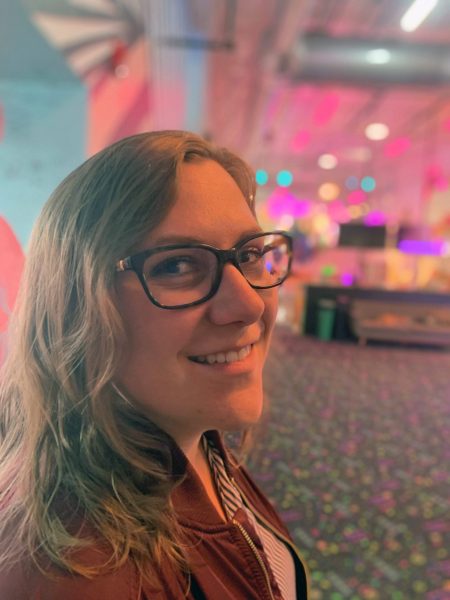
Many CSU music education graduates expand upon normalized approaches to music pedagogy to accommodate their students' needs and interests. Denver music teacher Hollie Ryckman is part of this transformative movement. Ryckman's teaching philosophy embodies a belief system rooted in inclusivity, embracing cultures within schools, and student-led learning.
Hollie Ryckman (M.M. in Music Education, '20) is a music teacher and the fine arts senior team lead at Denver West High School.
Classroom Inclusivity
"One way I'm inclusive is through representation," Rykman said. "I have flags in my classroom: the pride flag, the Chicano movement flag, the missing and murdered Indigenous women flag, the Black Lives Matter flag, and flags for each country my students and their families come from. We play all kinds of music, some that students recognize and some that are new. When students come into my classroom, they think, 'Ryckman supports me in who I am,' even if they aren't comfortable sharing it with others."
Denver West High School is home to different cultures and languages and features a newcomer center for students new to the United States. It also has a rich history in Denver civil rights movements, such as the West High School Blowout in 1969, when students demanded better educational opportunities and representation. Ryckman feels at home here as a bilingual teacher and pioneer of student-centered learning.
"There's a 'Mr. Holland's Opus' perception of Title 1 schools," Hollie says, "I'm not banging on student's heads, and there's no magic solution…really, it's just me trying to be the guidepost of finding what the community is passionate about. Being creative and willing to learn new and different things to support the students and their interests is in my wheelhouse."
Teaching with an open mind
After years of teaching, Ryckman has made it adamantly clear that her teaching style would be based on this open-minded method no matter where she taught – Title 1 or not. She utilizes the many different methods of teaching music and reflects with students on how each method is rooted in other parts of society and cultures.
"In my guitar classes, when we engage in standard notation and learn to read tabs, they ask, 'Why does standard notation even exist? Then we learn how to improvise, we learn chords, and we learn pentatonic scales versus natural scales, and they ask, 'Why does anyone do music this old way?' We talk about how different types of music and ways of notation fit different situations and how some methods have erased or devalued other methods. We have conversations about how our different skills and exposure to different contexts are strengths."
Ryckman assesses what students are interested in and follows their lead, including learning piano, hosting an all-school assembly, singing with a karaoke track, or learning to play video game songs.
Students' final projects consist of recording an existing song in a new style that changes the song's intent, effect, or impact. Students perform songs in their native language, sample other songs, write new verses, collaborate, and play with artistic freedom. At the end of the year, they perform at the HeART of West, an arts and musical festival hosted by the school.
For example, we just sang "Alleluia" by Leonard Cohen in my choir class, and my students reacted by saying: 'These lyrics are not very churchy. I've never really listened to the lyrics. I've never really listened to the chorus. My sister sang this at a funeral, etc.' So, we're unpacking that. Their final project will be creating covers of their own choice of song, and you know, that opens up space for my students who are Spanish speakers to choose Spanish music, and it opens up space for my students who are Muslim or are African immigrants. It allows them to sing or play songs in their native language."
Building trust over time
Ryckman's students and their parents don't inherently trust her, sometimes because of cultural differences or past trauma, but she's found that students who fail her class often retake it because it is a safe space for them.
Ryckman hopes graduating students feel like competent musicians with accomplishments they didn't think possible. She hopes they feel seen and accepted by the musical community she's nurtured within the school.
